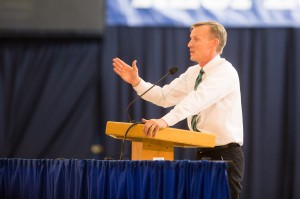
Testimonies of the Gospel of Jesus Christ include logic and reason even if they are not based solely on facts.
In his Education Week class for youth, John Bytheway focused on a testimony of feelings, experience, evidences and logic and reason. In Bytheway’s class on Friday, he discussed logic as a building block of someone’s testimony.
Bytheway presented an acronym he created to describe the apostasy.
A: apostles killed
P: philosophies adopted
O: ordinances changed
S: scriptures unavailable
T: translations emerge
A: America discovered
S: spirit of reformation
Y: young men see visions
Bytheway spoke about the apostasy and facts supporting it, and then led his discussion to the restoration.
“A reformation was not enough,” Bytheway said. “A restoration was needed. Who has the right to tell God to stop talking? Us? I don’t think so.”
Bytheway then related the story of when Elder David A. Bednar spent years writing a textbook. When the textbook was finally complete, Bednar asked himself why he wrote it. Bednar discovered that his personal answer was that now he knew from experience that Joseph Smith could not have written the Book of Mormon.
Within 12 months, Bednar’s textbook was obsolete.
“Take your quad and put it on the shelf and then wait,” Bytheway said. “You can wait a thousand years and that book will still be true.”
Bytheway shared an analogy of a puzzle being like a testimony. Just because a piece doesn’t fit in the puzzle yet, people don’t throw it away or yell that the puzzle is a fraud; they simply put it in a pile to examine at a later time. The same is true of a testimony.
What someone knows or believes to be true is what’s important, Bytheway said. The rest can come at a later time.
Next, Bytheway spoke extensively on nonmembers’ commentary on the light of members of The Church of Jesus Christ of Latter-day Saints. For examples, he referenced students he had interacted with all the way to Gladys Knight or occurrences at the BYU Jerusalem Center.
Bytheway said to keep asking, keep living and keep learning. Testimonies don’t come when someone is on his knees, but rather on his feet.
“I know because it makes sense,” Bytheway said. “It’s so fun being on a mission and have people nod as you’re explaining something and go ‘This makes sense. This just makes sense to me.'”




